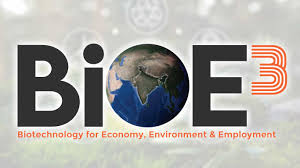India celebrated World Bioproduct Day with a nationwide Bioeconomy Innovation Drive, underlining ambitions to build a $300 billion bioeconomy by 2030, announced Union Science & Technology Minister Dr Jitendra Singh during an event organised by the DST, BIRAC and iBRIC+ at eight institutions across the country.
The day began with eight hours of hour‑by‑hour hybrid dialogues under the theme ‘Voices Across the Cities’, focusing on coastal biomass, marine bioproducts, agri‑residue valorisation, enzyme‑driven bio‑industries, ethnobotany and forestry-derived bio‑products. These sessions brought together academics, start‑ups, industry and civil society to foster inclusive bio‑economic growth. Dr Singh emphasised that biotechnology is no longer confined to laboratories but is shaping livelihoods—from biodegradable packaging to eco‑friendly personal care—while creating green jobs and rural employment. He hailed the BioE3 Policy (Biotechnology for Economy, Environment and Employment) as a critical framework aligning environmental goals with equitable economic development.
The minister reflected on the sector’s dramatic growth—from around 50 biotech startups a decade ago to nearly 11,000 today—highlighting the combined impact of policy support and institution‑industry partnerships. He emphasised that achievable success depends on sustained financial aid and early-stage accelerator support, not just idea generation . Notable speakers included Dr Rajesh S. Gokhale, Secretary of DBT and BIRAC Chair, who outlined BioE3’s mechanisms—pilot manufacturing support, region‑specific missions, and academic‑industry linkages aimed at progressing from lab research to market impact.
World Bioproduct Day has been observed annually since 2021 to spotlight the role of bioproducts in fostering environmental sustainability and the circular economy. The 2025 theme, “World Bioproduct Day – The BioE3 Way,” reinforced the linkage between national biotech ambitions and sustainable development priorities. The hybrid dialogue format enabled decentralised outreach, enabling diverse communities—from coastal biomass researchers to forest-based innovators—to share insights synchronously across multiple cities. Such inclusive engagement promotes equitable access to biotech benefits and sustains the momentum of India’s clean‑economy transition.
Looking ahead, achieving the $300 billion target will require translating discussions into action—mobilising rural bio‑enterprises, supporting urban biotech hubs, and integrating traditional knowledge systems with modern biomanufacturing . This pathway aligns with India’s broader sustainability goals and net‑zero urban roadmap. As World Bioproduct Day concludes, India stands at a defining moment: the question is not whether biotechnology can power future industries, but whether India can lead a global bioproduct revolution that is economically empowering, socially inclusive, and environmentally regenerative.
Also Read: New Delhi plans solar canopy over Munak Canal to save water energy


